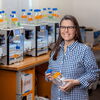Biddeford infant health startup gets $3.5M NIH grant
 File photo / Tim Greenway
John Konsin leads Prapela, a Biddeford-based infant health startup.
File photo / Tim Greenway
John Konsin leads Prapela, a Biddeford-based infant health startup.
Prapela Inc., a Biddeford-based infant health startup that has pioneered a technology-enabled bassinet pad to help newborn babies breathe, sleep and relax, will receive a three-year, $3.5 million research grant from the National Institutes of Health.
The agency awarded the grant to support the development and evaluation of Prapela's pad to treat apnea in preterm newborns, in collaboration with neonatologists at Tufts Medical Center in Boston and the University of Alabama at Birmingham.
The award comes three months after the U.S. Food & Drug Administration granted Prapela's device Breakthrough Device Designation and Prapela has submitted its plans to the FDA to help expedite clearance.
To date, Prapela has received close to $8.4 million in funding from several “non-dilutive” sources, including the NIH, FDA, and the states of Ohio, Maine and Massachusetts, John Konsin, the company’s co-founder and CEO, told Mainebiz.
He said the largest contributor of that amount has been the NIH, via its competitive Small Business Innovative Research program, and he believes that Prapela has been awarded more NIH funding than any other startup based in Maine.
Prapela will use the latest grant money to fund the development of a pad with the company’s proprietary stimulation technology for use in neonatal incubators and a clinical study to test the safety and efficacy of the pad.
The clinical study will evaluate the effectiveness of the pad in reducing apnea in preterm newborns compared to a control group. If successful, the results will be submitted to the FDA to gain regulatory clearance.
"Investment in and development of pediatric devices is so crucial for our children and their caregivers,” Konsin said in an April 6 news release. "Prapela is honored to collaborate with Tufts MC and UAB to create a new approach that we hope one day will help all premature babies breathe and their parents and caregivers breathe easier."
Prapela's stimulation technology is limited to investigational use only.
Nearly all preterm infants born at less than 28 weeks gestation and 85% born at 30 weeks gestation are affected by apnea of prematurity, a condition in which the child stops breathing for more than 20 seconds, or 10 seconds, followed by a slow heartbeat. The condition is much more common in premature babies than in full-term babies, and the use of caffeine as a treatment is only partially effective.
"Caffeine was introduced more than 20 years ago, and there hasn't been anything new since,” said Dr. Rachana Singh, associate chief of newborn medicine at Tufts Medical Center. "We are excited to be working with Prapela and UAB on a very promising therapy for apnea in preterm newborns."













0 Comments